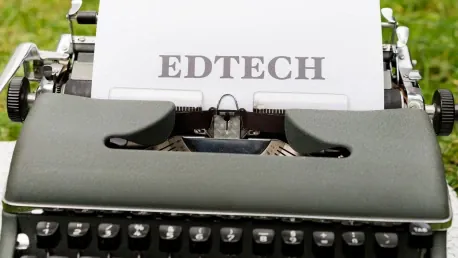The EdTech Monday November edition, held at the KTradio studios in Kigali, Rwanda, has highlighted the significant strides in incorporating innovative digital tools and a competency-based curriculum (CBC) in schools across Rwanda. While acknowledging the progress made, the program also spotlighted the existing gaps within the education system. Despite facing numerous challenges, the implementation of digital tools has undeniably improved learning and teaching experiences for both students and educators. The discussion brought attention to the need for continuous efforts and investments to enhance the integration of EdTech in the Rwandan education sector.
Progress in Digital Tools and Competency-Based Curriculum
Rwanda has made considerable progress in integrating digital tools and a competency-based curriculum (CBC) in its education system. The introduction of these tools has enhanced both teaching and learning experiences, making education more interactive and efficient. The CBC, developed in 2015, aims to equip students with practical skills and knowledge, preparing them for the global job market. These developments are instrumental in aligning Rwanda’s education sector with its developmental goals and Vision 2050. The transformation in the teaching and learning process is evident, as digital tools have become a vital component of modern education in Rwanda.
Angela Rugo, the Managing Director of the Rwanda Education Quality Improvement Program (RwandaEQUIP), discussed the transformative measures taken to make Rwanda’s basic education globally competitive. According to her, RwandaEQUIP has trained over 17,000 teachers across 761 schools, updating them with new pedagogical skills and distributing tablets equipped with lesson plans. One notable feature is the “Let’s Mark” application, which allows teachers to correct students’ exercises efficiently. This app reduces the time spent on marking, thereby enabling teachers to focus more on preparing and researching for lessons, ultimately improving productivity. Rugo emphasized that these advancements are crucial in ensuring that teachers can meet the demands of modern education and provide students with a high-quality learning experience.
The Challenge of Localization in EdTech Solutions
A central point of discussion is the lack of localization in educational technology (EdTech) solutions. According to a report by Laterite and the Mastercard Foundation, only 25% of surveyed EdTech solutions in Rwanda were designed with content that resonates with local realities. This discrepancy often leads to disengagement among learners and diminishes the effectiveness of digital tools. The report emphasizes the need for focused investments in locally relevant e-learning content to bridge this gap and ensure alignment with Rwanda’s development goals, as outlined in Vision 2050. Ensuring that EdTech solutions are tailored to the local context is essential for maximizing their impact and making education more relevant and engaging for Rwandan students.
Melanie Niyonita, a teacher, highlighted the availability of essential technological equipment like laptops and internet access in most primary and secondary schools. However, she echoed the pressing need for continuous training to help teachers appropriately integrate EdTech skills into their teaching. This sentiment was shared by other speakers, who stressed the importance of ongoing teacher training in digital skills and capacity building in the latest technologies. To address this challenge, there must be sustained efforts to provide teachers with the necessary skills and knowledge to effectively use EdTech solutions in their classrooms, making education more accessible and inclusive for all students.
Private Sector Contributions and New EdTech Policy
Abdulrahman Niyonizeye, the Co-founder and CEO of SmartClass Ltd, emphasized that digital tools could significantly reduce the time teachers spend in classrooms. By preparing organized lesson plans and automating evaluations, technology can enable teachers to handle more classes and students efficiently. Niyonizeye clarified that once the questions are set in a multiple-choice format, teachers can conduct evaluations quickly – even for as many as 200 students in a single day. This efficiency allows teachers to dedicate more time to personalized instruction and support for students, ultimately enhancing the quality of education delivered.
SmartClass Rwanda, a private sector online learning platform, aims to connect Rwandan high school students with similar academic subjects, providing access to valuable learning materials and high-quality teachers. Niyonizeye also revealed that a new Rwanda EdTech policy is being developed, currently about 80% complete. This policy is expected to address existing gaps by investing in digital infrastructure, devices, and digital literacy to ensure all students have access to digital education. It will also facilitate collaboration between the government, EdTech stakeholders, and within the EdTech ecosystem, reflecting the private sector’s readiness to contribute through the Rwanda ICT Chambers. The policy aims to create a supportive environment for EdTech innovation and integration, fostering a culture of continuous improvement and adaptation within the education sector.
Government Initiatives and Teacher Training
The November edition of EdTech Monday, held at the KTradio studios in Kigali, Rwanda, underscored the significant progress made in integrating innovative digital tools and a competency-based curriculum (CBC) in schools across Rwanda. Hosted at KTradio studios, the program celebrated these advancements while also acknowledging the gaps that still exist within the education system. Despite the numerous challenges faced, the implementation of digital tools has substantially enhanced the learning and teaching experiences for both students and educators. This discussion shed light on the necessity for ongoing efforts and investments to further integrate EdTech into the Rwandan education sector. The discourse also highlighted how these advancements can bridge the existing disparities and the crucial role of stakeholders in ensuring continuous improvement. As Rwanda makes strides in modernizing its education system, the commitment to leveraging technology remains a key focus, aiming to create a more effective and inclusive educational environment for future generations.









